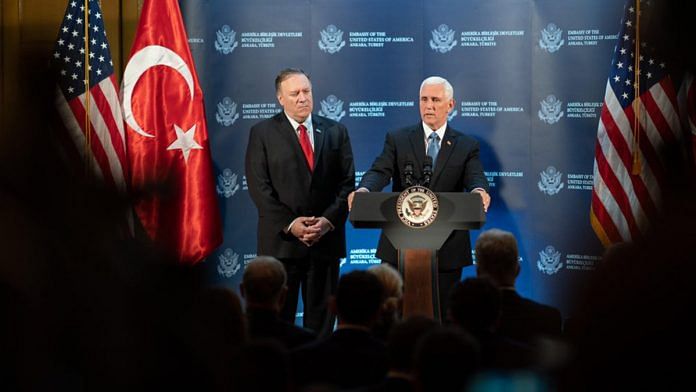New Delhi: United States and Turkey agreed to a ceasefire in Northeast Syria and Kurdish forces have been asked to withdraw from what Turkey terms a “safe-zone” on the border Thursday. The ceasefire was announced following talks between US Vice President Mike Pence and Turkish President Recep Tayyip Erdogan.
After a few hostile weeks of diplomacy, Pence had travelled to Ankara to meet the President.
The ceasefire
“The ceasefire grants the Kurdish-led forces that were Washington’s main Syrian ally in the fight against the Islamic State of Iraq and the Levant (ISIL, or ISIS) five days to withdraw from the so-called “safe-zone” Ankara wants to establish inside Syria,” reported Al Jazeera.
“We are suspending the operation, not halting it. We will halt the operation only after [Kurdish forces] completely withdraw from the region,” said Mevlut Cavusoglu, Turkey’s Foreign Minister.
Meanwhile, the Syrian Democratic Force (SDF), the leading Kurdish militia, has agreed to accept Turkey’s ceasefire, but the extent of its compliance is unclear.
Gen. Mazloum Abdi, the commander-in-chief of SDF said that there was a ceasefire agreement in the towns of Ras-al-Ain and Tal Abyad. These are the two towns that have seen the most lethal fighting between the Turkish forces and the SDF.
“This agreement is tentative and will ensure a halt to the Turkish occupation of the region,” remarked Abdi.
What are the immediate implications?
The US had implemented sanctions against senior Turkish ministers and officials and had threatened to apply more, if Turkey didn’t stop its military assault.
Pence announced that US will not impose any further sanctions and will lift the existing ones if a permanent ceasefire goes into effect.
The Turkish offensive began on October 9 and “72 civilians had been killed inside Syria and more than 300,000 displaced over the past eight days,” noted BBC.
The ceasefire, if sustained over a long period, is expected to prevent further casualties.
Political observers are also closely watching the impact of the ceasefire on the revival of the ISIS. SDF had been a major force fighting against the ISIS and since its resources had to be redirected towards fighting Turkish forces, several prisoners from the Islamic State have fled captivity.
US response to the ceasefire
US President Donald Trump hailed the American effort to ensure a ceasefire between Turkey and Syrian Kurds and tweeted, “Millions of lives will be saved!”
At a rally Trump remarked, “Sometimes you have to let them fight, like two kids in a lot. You have to let them fight, and then you pull them apart!”
Unlike Trump, analysts and observers of Middle Eastern politics continue to remain sceptical, both about the sustainability of this ceasefire and the ability of Turkey to fend off US sanctions for a long time.
“Washington is going to play this as a victory … I think it just opens the door for another less visible, longer but equally ugly conflict,” said Richard Engel, Chief Foreign Correspondent of NBC News.
Talking about the possibility of the US Congress reimplementing sanctions against Turkey, Harvard University’s David Ignatius tweeted, “Trump doesn’t seem to understand that our Kurdish allies are very popular with Congress, prompting a rare alliance between Lindsey Graham and Nancy Pelosi. Erdogan, meanwhile, is very unpopular.”
“Unless it clearly protects Kurds — as opposed to allowing new horrors — it won’t fly with Congress and anti-Turkey sanctions will return harder than ever…” he added.



